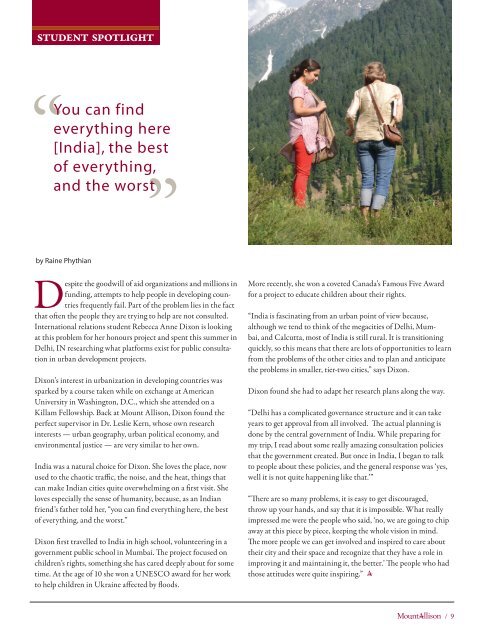PDF download - Alumni Online - Mount Allison University
PDF download - Alumni Online - Mount Allison University
PDF download - Alumni Online - Mount Allison University
Create successful ePaper yourself
Turn your PDF publications into a flip-book with our unique Google optimized e-Paper software.
student sPOtLiGht<br />
“<br />
You can find<br />
everything here<br />
[India], the best<br />
of everything,<br />
”<br />
and the worst<br />
by Raine Phythian<br />
Despite the goodwill of aid organizations and millions in<br />
funding, attempts to help people in developing countries<br />
frequently fail. Part of the problem lies in the fact<br />
that oft en the people they are trying to help are not consulted.<br />
International relations student Rebecca Anne Dixon is looking<br />
at this problem for her honours project and spent this summer in<br />
Delhi, In researching what platforms exist for public consultation<br />
in urban development projects.<br />
Dixon’s interest in urbanization in developing countries was<br />
sparked by a course taken while on exchange at American<br />
<strong>University</strong> in Washington, D.C., which she attended on a<br />
Killam Fellowship. Back at <strong>Mount</strong> <strong>Allison</strong>, Dixon found the<br />
perfect supervisor in Dr. Leslie Kern, whose own research<br />
interests — urban geography, urban political economy, and<br />
environmental justice — are very similar to her own.<br />
India was a natural choice for Dixon. She loves the place, now<br />
used to the chaotic traffi c, the noise, and the heat, things that<br />
can make Indian cities quite overwhelming on a fi rst visit. She<br />
loves especially the sense of humanity, because, as an Indian<br />
friend’s father told her, “you can fi nd everything here, the best<br />
of everything, and the worst.”<br />
Dixon fi rst travelled to India in high school, volunteering in a<br />
government public school in Mumbai. Th e project focused on<br />
children’s rights, something she has cared deeply about for some<br />
time. At the age of 10 she won a UnESCO award for her work<br />
to help children in Ukraine aff ected by fl oods.<br />
More recently, she won a coveted Canada’s Famous Five Award<br />
for a project to educate children about their rights.<br />
“India is fascinating from an urban point of view because,<br />
although we tend to think of the megacities of Delhi, Mumbai,<br />
and Calcutta, most of India is still rural. It is transitioning<br />
quickly, so this means that there are lots of opportunities to learn<br />
from the problems of the other cities and to plan and anticipate<br />
the problems in smaller, tier-two cities,” says Dixon.<br />
Dixon found she had to adapt her research plans along the way.<br />
“Delhi has a complicated governance structure and it can take<br />
years to get approval from all involved. Th e actual planning is<br />
done by the central government of India. While preparing for<br />
my trip, I read about some really amazing consultation policies<br />
that the government created. But once in India, I began to talk<br />
to people about these policies, and the general response was ‘yes,<br />
well it is not quite happening like that.’”<br />
“Th ere are so many problems, it is easy to get discouraged,<br />
throw up your hands, and say that it is impossible. What really<br />
impressed me were the people who said, ‘no, we are going to chip<br />
away at this piece by piece, keeping the whole vision in mind.<br />
Th e more people we can get involved and inspired to care about<br />
their city and their space and recognize that they have a role in<br />
improving it and maintaining it, the better.’ Th e people who had<br />
those attitudes were quite inspiring.”<br />
/ 9


